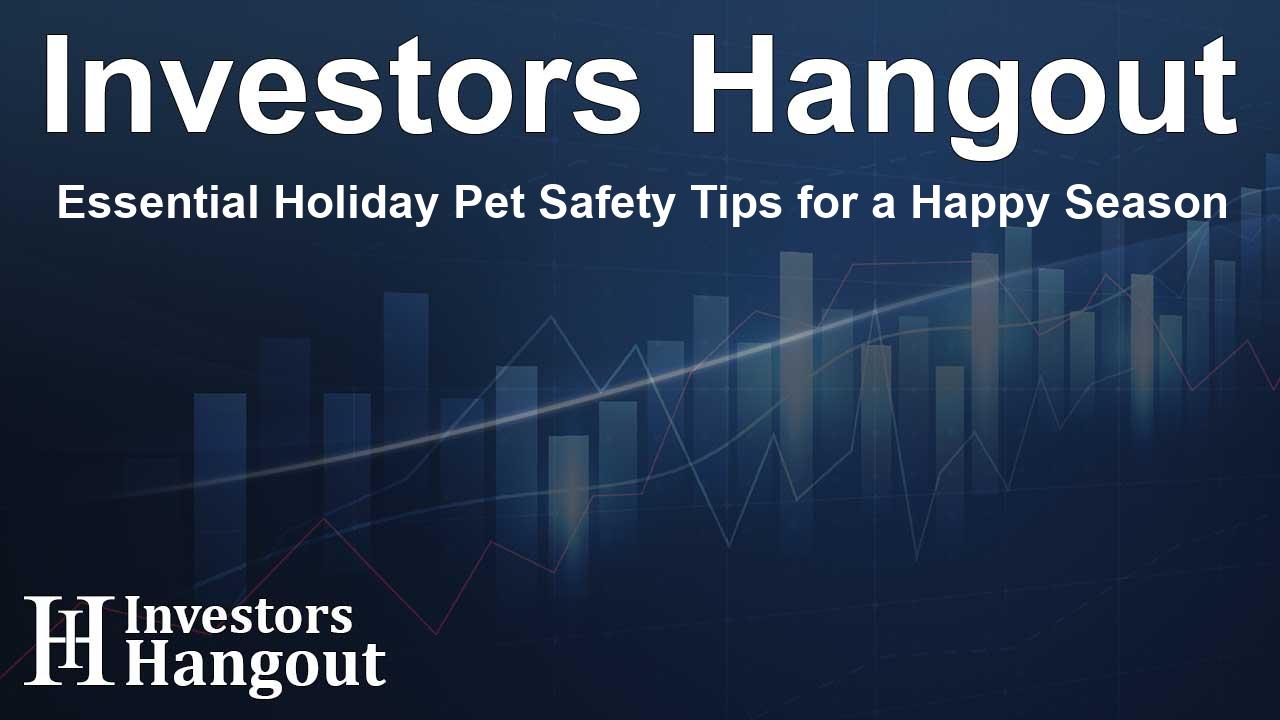Essential Holiday Pet Safety Tips for a Happy Season

Keep Your Pets Safe This Holiday Season
As the holiday season approaches, pet owners often find themselves in joyful gatherings with family and friends. However, amidst the celebrations, it's vital to be aware of the health risks associated with including pets in festive activities, particularly when it comes to food. While it might be tempting to share holiday treats with our furry friends, many human foods and drinks can lead to serious health issues for dogs and cats.
Understanding Holiday Hazards for Pets
Pets are naturally curious, especially around food, making it essential for owners to understand what foods are hazardous. Experts warn that even small amounts of festive favorites can result in health complications ranging from mild to severe, causing unnecessary stress during what should be a joyful time.
Common Food Dangers
Here are some of the most common food-related dangers that pet owners should avoid:
- Chocolate: In December, there is a significant increase in chocolate toxicity claims among pets. Symptoms of chocolate ingestion include vomiting, a racing heartbeat, or even seizures in severe cases. Keep all chocolate products well out of reach of curious pets.
- Alcohol: Even a tiny amount of alcohol can lead to lethargy, vomiting, and potential respiratory issues in pets. It's crucial to ensure that your beverages remain out of paw's reach.
- Fatty Foods: Rich holiday foods like ham and gravy can trigger pancreatitis in pets. This condition can cause severe abdominal pain and distress, requiring urgent veterinary care.
Festive Foods to Avoid
In addition to the above, here are more holiday staples to keep away from your pets:
- Onions, Garlic, and Chives: These common ingredients can lead to anemia in both dogs and cats.
- Grapes and Raisins: Even small amounts can be toxic to dogs and may result in kidney failure.
- Xylitol: Often found in sugar-free products, this sweetener can cause dangerous drops in blood sugar levels and liver failure in pets.
- Bones and Corn Cobs: These can splinter when chewed, posing a choking hazard or causing intestinal blockage.
Safe Food Alternatives for Your Pets
When considering festive treats for your pets, there are safe options that won't cause harm. Here are some delicious and safe snacks to offer:
- Pumpkin: Pure pumpkin puree, without added sugar or spices, can be a delightful treat mixed into their regular food or in homemade cookies.
- Apples: A great source of fiber and vitamins, apples can be a tasty addition when sliced into their meal.
- Carrots: Both raw and cooked carrots are excellent for dental health and provide beneficial nutrients.
- Green Beans: These can be served steamed or raw, offering a fiber-rich option pets often enjoy.
- Plain Turkey: Unseasoned, cooked turkey breast is a protein-rich treat that many pets find irresistible.
Utilizing Resources for Pet Safety
Pet owners should take advantage of resources designed to help manage their pets' health during the busy holiday season. Digital platforms can assist in assessing pets' unique risk levels while offering insights into symptoms to watch for and the associated costs of potential health concerns.
About Nationwide
Nationwide is recognized as one of the largest financial services and insurance providers in the nation. With a strong focus on innovation and customer service, they offer a comprehensive range of products including pet insurance, ensuring that pets receive the necessary care when needed. Their commitment to pet wellness aligns with the growing need for increased awareness regarding pet health, particularly during the holiday season.
Frequently Asked Questions
1. What holiday foods are dangerous for pets?
Chocolate, alcohol, grapes, onions, and fatty foods should all be avoided as they can pose serious health risks to pets.
2. How can I safely treat my pet during the holidays?
Consider offering safe foods like plain turkey, pumpkin, carrots, and green beans in moderation to treat your pets without harm.
3. What symptoms should I watch for if my pet eats something harmful?
Look out for vomiting, lethargy, diarrhea, or unusual behavior, and contact your veterinarian for advice.
4. Where can I find more information about pet safety?
Resources such as pet insurance websites and veterinary advice platforms can provide valuable insights into keeping pets safe.
5. How can pet insurance help during the holiday season?
Pet insurance can help cover unexpected veterinary expenses if your pet ingests something harmful, reducing financial stress for owners.
About The Author
Contact Hannah Lewis privately here. Or send an email with ATTN: Hannah Lewis as the subject to contact@investorshangout.com.
About Investors Hangout
Investors Hangout is a leading online stock forum for financial discussion and learning, offering a wide range of free tools and resources. It draws in traders of all levels, who exchange market knowledge, investigate trading tactics, and keep an eye on industry developments in real time. Featuring financial articles, stock message boards, quotes, charts, company profiles, and live news updates. Through cooperative learning and a wealth of informational resources, it helps users from novices creating their first portfolios to experts honing their techniques. Join Investors Hangout today: https://investorshangout.com/
The content of this article is based on factual, publicly available information and does not represent legal, financial, or investment advice. Investors Hangout does not offer financial advice, and the author is not a licensed financial advisor. Consult a qualified advisor before making any financial or investment decisions based on this article. This article should not be considered advice to purchase, sell, or hold any securities or other investments. If any of the material provided here is inaccurate, please contact us for corrections.
